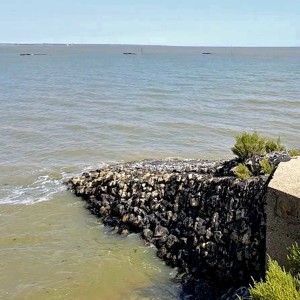
Stop walking! There's a place to sit. Roll up your jacket to make a cushion and perch on the rocks, just for a moment, to take in the view. Look! Over the expanse of cloud-dappled water, beyond, where the outgoing surge of the river Blackwater swirls into the North Sea, that's Mersea Island. From here, just a sliver of low lying land.
A few miles up the coast, though not yet in sight, are the two giant blockhouses of the now decommissioned and quiescent Bradwell nuclear power station built in 1957. Between the cuffing gusts of the onshore breeze, the air here feels unusually still of human noise. Unusually crisp, unusually vibrant with textural sounds. Deep inside clouds and far out over the channel, are some passing rumbles. Not thunder, more like low flying military jets patrolling and underlining some invisible boundary out there, over the sea.
Their distant rumblings not only illuminate, through sound, the infinite void of the sky, but bring contrast to the very tiniest, very closest of sounds. Countless fine edged movements, of a sand made of featherlight shells. Shifting and sifting, picked up and dropped, by gentle, inquisitive waves.
Somehow, a quarter of an hour has passed. The rock pools between the sunken concrete barges that make up the sea wall, are now filling, and swirling, with the rising tide. Moving back up the rocks, above the high water mark, you find a new place to sit, and watch, as the pools overflow, merge into one another, to become new areas of wide open sea. The planes are gone. The footpath beckons. But you stay for a little while longer, just to listen to the changing sounds of the fast disappearing rock garden.
More Episodes
 2021-10-09
2021-10-09
 2.0k
2.0k
 2021-10-02
2021-10-02
 2.0k
2.0k
 2021-09-25
2021-09-25
 2.4k
2.4k
 2021-09-18
2021-09-18
 2.2k
2.2k
 2021-09-11
2021-09-11
 2.0k
2.0k
 2021-08-07
2021-08-07
 2.0k
2.0k
 2021-07-24
2021-07-24
 1.8k
1.8k
 2021-07-17
2021-07-17
 1.8k
1.8k
 2021-07-10
2021-07-10
 2.0k
2.0k
 2021-06-26
2021-06-26
 2.2k
2.2k
 2021-06-05
2021-06-05
 3.0k
3.0k
 2021-05-29
2021-05-29
 2.3k
2.3k
Create your
podcast in
minutes
- Full-featured podcast site
- Unlimited storage and bandwidth
- Comprehensive podcast stats
- Distribute to Apple Podcasts, Spotify, and more
- Make money with your podcast
It is Free
- Privacy Policy
- Cookie Policy
- Terms of Use
- Consent Preferences
- Copyright © 2015-2024 Podbean.com






